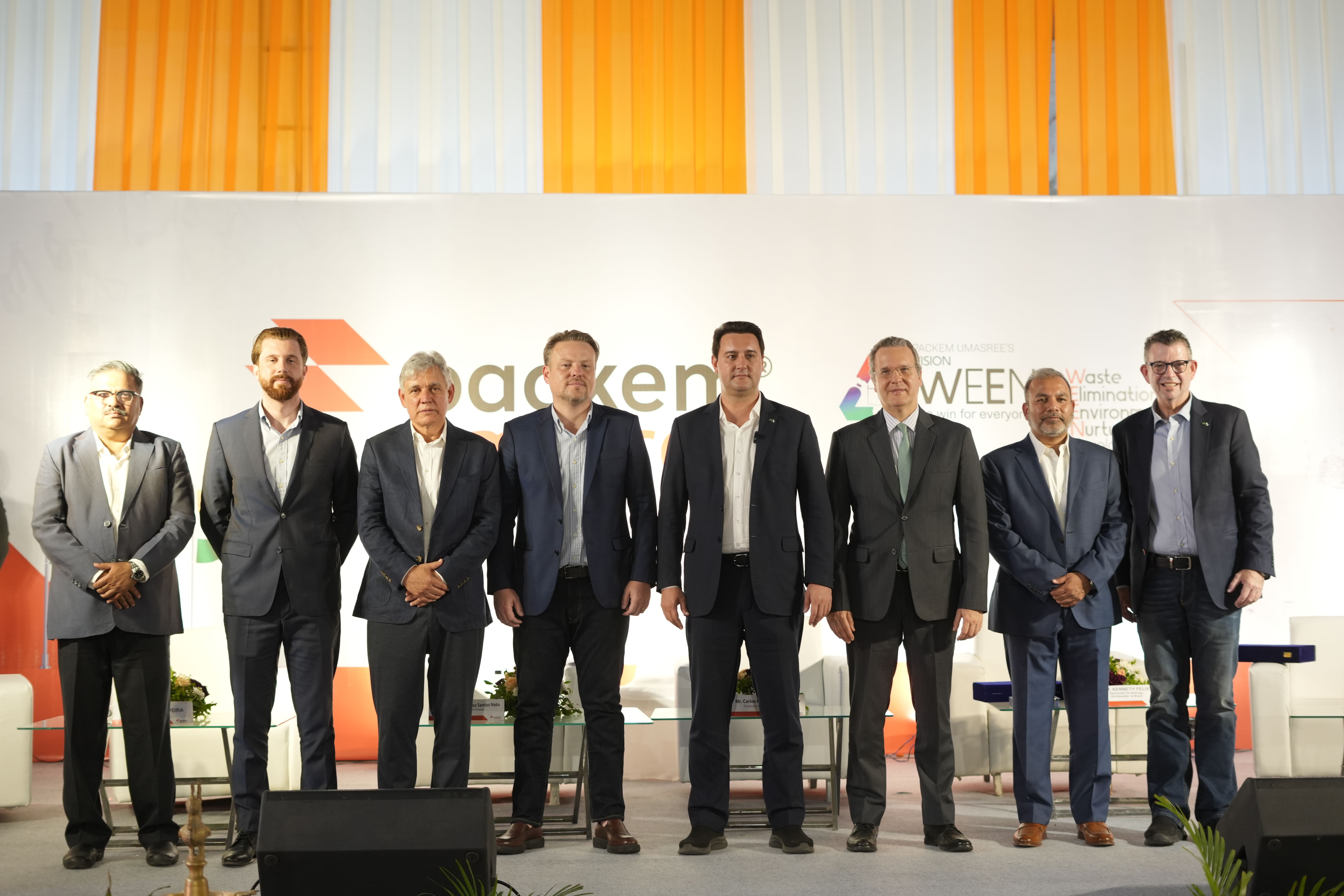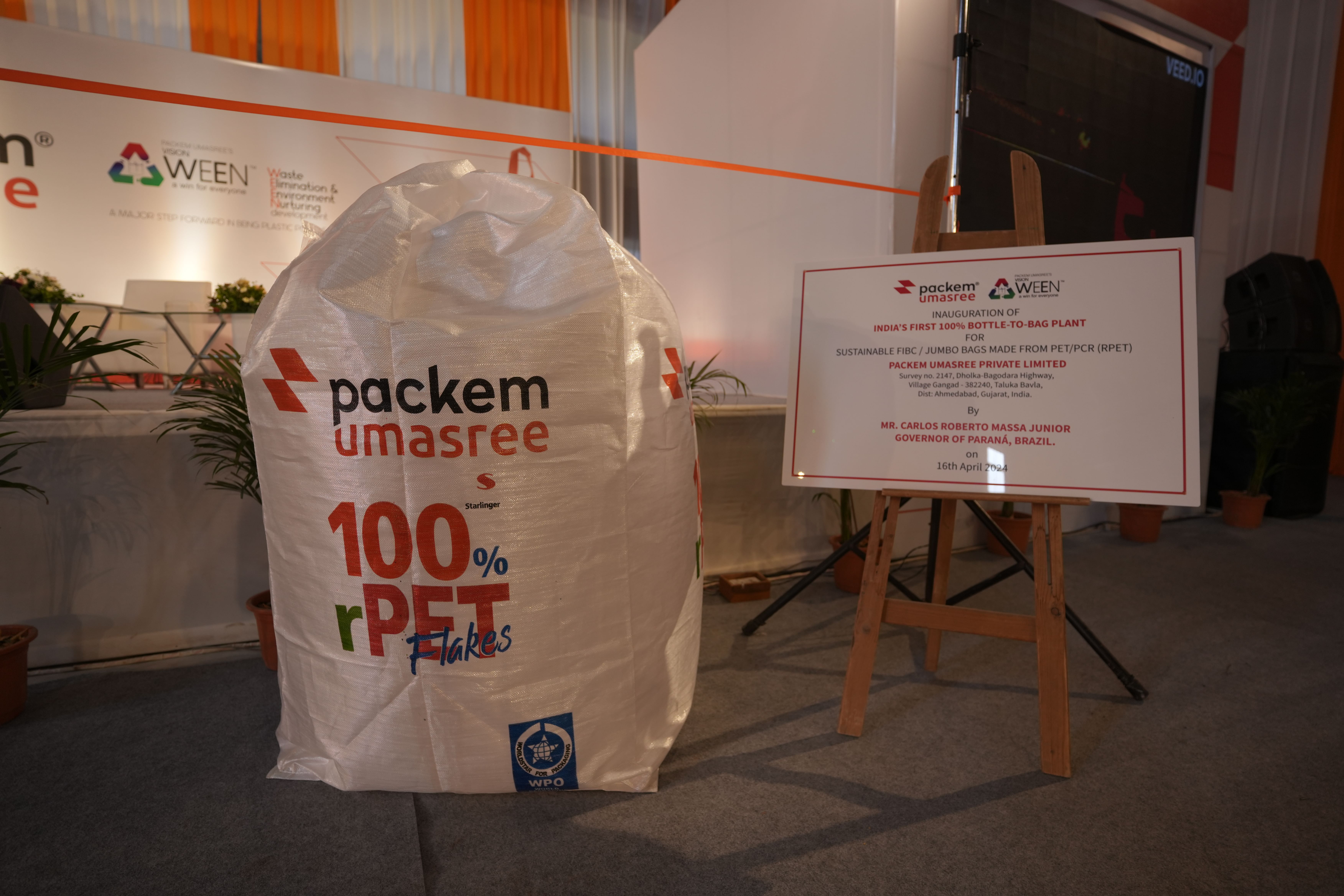Packem Umasree sets export targets with Ahmedabad plant
Packem Umasree launches India’s first 100% sustainable rPET bottle-to-bag plant in Ahmedabad on 16 April. Punit Gopalka, CEO and director, Packem Umasree in a conversation with WhatPackaging? shares, “The installation aims to produce 100% sustainable Flexible Intermediate Bulk Containers (FIBC) bags from recycled PET or PCR”
13 May 2024 | By WhatPackaging? Team
WhatPackaging?: How is the establishment of this plant expected to expand the market share and business growth of packaging in India?
Punit Gopalka (PG): The establishment of the 100% sustainable rPET bottle-to-bag plant marks a significant step towards sustainability in the packaging industry. By providing a circular solution, we aim to help companies reduce their carbon footprint. Our goal is to lead the industry in sustainability and increase our market share in India by 15% within the next three years.
WhatPackaging?: Why was western India chosen as the location for the plant?
PG: Western India was chosen due to its strategic location, well-developed infrastructure, and industry-friendly policies by government and accessibility to ports, allowing efficient distribution domestically and internationally. The region’s robust economic growth and vibrant industrial sector offer a conducive environment for our business. We have even signed an MOU with the Government of Gujarat and are thankful for their support.
WhatPackaging?: Please share the highlights of the factory
PG: Our plant is a significant investment in sustainability and innovation. The installation cost approximately Rs 300-cr and the total area is 54,000 square metres. We shall be providing direct employment to over 700 people and indirect employment to over 2,000 people. Our customers come from a range of industries, including agriculture, food processing, chemicals, and pharmaceuticals. The plant’s strategic location and advanced technology enable us to meet the diverse needs of our customers and drive business growth.
WhatPackaging?: What is the overall outlook for your company for this territory?
PG: The outlook for our company in this territory is highly positive. With our focus on sustainability and innovative packaging solutions, we aim to strengthen our market position and expand our customer base. We expect steady growth and are committed to continuously improving our products and services. Our goal is to be a leader in sustainable packaging and contribute to the region’s economic development while reducing environmental impact.
WhatPackaging?: What are your export targets with FIBC bags?
PG: We plan to export around 500-600 MT of FIBC bags per month.
WhatPackaging?: What are the typical challenges or bottlenecks faced and how do you remedy them?
PG: Typical challenges in the FIBC industry include raw material sourcing, compliance with changing regulations, and logistics. To address these, we have implemented robust supply chain management practices and diversified our supplier base to ensure a steady flow of recycled materials. We stay updated on regulatory changes and invest in compliance measures to meet or exceed industry standards. To address logistics, we have established partnerships with reliable transportation and shipping companies to ensure timely delivery to our customers.
On 16 April, Packem Umasree inaugurated a rPET bottle-to-bag factory which saw over 150 delegates and invitees
WhatPackaging?: What distinguishes Packem Umasree in the Indian market?
PG: Packem Umasree stands out in the Indian market because we are the first company in the country to produce 100% sustainable FIBC/jumbo bags made entirely from recycled PET (rPET). This approach aligns with global sustainability trends and caters to environmentally conscious customers. In addition to the sustainability feature, rPET big bags are durable, resistant to solar radiation, have a good abrasion resistance, perform in temperatures ranging from -20 to +140 degree C, and maintain their shape well, making them perfect for long-term storage. After use, these bags can be recycled and repurposed to create new ones.
WhatPackaging?: Comment on Packem Umasree’s approach with project ‘WEEN’. What are the measures the company adopts to achieve its sustainability goals, towards circularity and to contribute to the Government of India’s Sustainable Development Goals (SDG) initiatives?
PG: Project Waste Elimination & Environment Nurturing (WEEN) is a part of our vision to promote sustainability and circularity in our operations. It’s a major step forward in being plastic positive and will orient our actions to contribute to the Government of India’s Sustainable Development Goals (SDG) initiatives. At Packem Umasree WEEN, we shall focus on procuring used PET bottles and converting them into recycled PET flakes which can be further used for multiple applications like manufacturing of rPET FIBCs, threads and bottles.
WhatPackaging?: What methods are you adopting?
PG: At Packem Umasree, we focus on using recycled materials, reducing waste, and optimising energy consumption. We aim to align our efforts with the Government of India’s SDGs in consumption and production. Our measures include implementing a closed-loop system, sourcing eco-friendly materials, and actively reducing our carbon footprint.
WhatPackaging?: Any new products or technologies in the pipeline?
PG: Following our successful launch at Interpack 2023, we are excited about our pipeline of innovative products and technologies. We are in discussions with our customers and working on packaging solutions with rPET FIBCs which can help them mitigate the current challenges being faced with PP FIBCs.
WhatPackaging?: What are the environmental consequences of utilising recycled PET (rPET) in FIBC/jumbo bags?
PG: Utilising recycled PET (rPET) in FIBC/jumbo bags reduces environmental impact. It helps decrease the demand for virgin plastic, reducing energy consumption and carbon emissions associated with production. Additionally, it reduces the amount of plastic waste in landfills and oceans. The target markets for these bags are industries seeking sustainable packaging solutions, such as agriculture, food processing, pharmaceuticals, and chemicals. Our eco-friendly FIBC bags appeal to companies prioritising sustainability and corporate social responsibility.
WhatPackaging?: According to you, what are the factors that drive the growth of the rPET FIBC industry?
PG: The key factors driving the growth of the rPET FIBC industry are increasing environmental awareness, stringent regulations promoting sustainability, and consumer demand for eco-friendly products. Companies are seeking sustainable packaging solutions to meet regulatory requirements and align with consumer expectations. Additionally, there are performance benefits which makes them an attractive choice for businesses looking to reduce their carbon footprint without compromising on quality or performance.
WhatPackaging?: How does the membership with FIBCA benefit the company? Limited to meeting food packaging compliances or extends scope to other industries as well?
PG: Membership with Flexible Intermediate Bulk Container Association (FIBCA), based in the USA, offers numerous benefits. It extends beyond meeting food packaging compliances to include networking opportunities, industry insights, and best practices. Through FIBCA, we gain access to valuable resources, compliance guidance, and industry trends. This membership helps us ensure that our products meet the highest standards, not only in the food industry but also across other sectors such as chemicals, agriculture, and pharmaceuticals.
Packem Umasree is the first company in India to produce 100% sustainable FIBC/jumbo bags made entirely from recycled PET (rPET)
WhatPackaging?: Outlook for the packaging industry for 2024?
PG: The outlook for the packaging industry in 2024 is positive, with sustainability and innovation at the forefront. We anticipate continued growth in demand for eco-friendly packaging solutions, driven by increased environmental consciousness among consumers and businesses. The adoption of new technologies and materials will play a crucial role in shaping the industry. We expect the packaging industry to focus on circularity, waste reduction, and smart packaging to meet evolving market needs and regulatory requirements.
WhatPackaging?: How is the balance between innovation and sustainability achieved?
PG: Balancing innovation and sustainability requires a holistic approach. At Packem Umasree, we invest in research and development to find innovative solutions that are both eco-friendly and functional. We focus on using recycled materials, optimising production processes, and reducing waste. Innovation is driven by our commitment to sustainability, ensuring that our products are not only advanced but also environmentally responsible. This balance allows us to offer high-quality products.
Packem Umasree - At a glance
Packem Umasree is a joint venture between Umasree (India) and Packem SA (Brazil), combining decades of experience in the packaging industry. Umasree has been a leading manufacturer of FIBC Bags in India, while Packem SA has expertise in producing FIBC/jumbo bags in Brazil. We bring together our respective strengths to create a unique offering in the Indian market, focusing on environmentally friendly packaging solutions. Our collaborative approach allows us to leverage global expertise and bring innovative products to our customers.
FIBC Bags are a make-to-order product which is customised as per the client requirement. For our plant, we have partnered with world class suppliers who have made their mark in the industry through their unparalleled quality and reliance for over 100 years.




